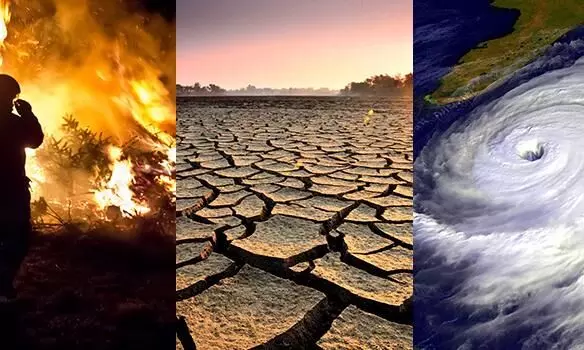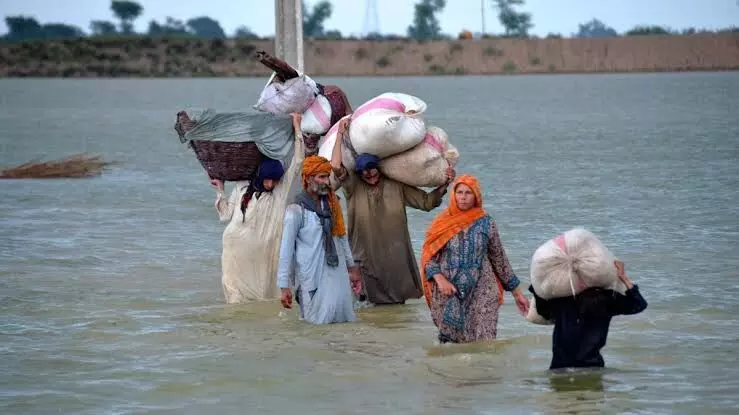
Climate should be the priority among priorities
text_fieldsImage for representation only
The climate crisis is wreaking havoc all over the planet. Unforeseen calamities are increasing in number and intensity, rendering even warning systems irrelevant. Despite the decrease in total rainfall in Kerala, flash floods, soil erosion and landslides are on the rise. About a thousand people died in an unexpected flood in Pakistan; crores became helpless. A week ago, what the world heard as climate disasters was extreme heat and drought. European countries with generally colder climate registered their highest temperatures on record. Forest fires increased in frequency and extent. In Spain alone, hundreds of wildfires have spread during the hot wind. Thousands died in Europe alone due to blazing weather. For the first time in history, Britain declared a climate emergency due to hot climate. Now Pakistan did the same due to excessive rain. A month ago, many parts of India experienced not only scorching heat but also heavy rains. Heavy rains were also reported in different regions from America to China. But now what we hear are reports of severe drought. Great rivers are drying up on most continents. Europe's great river, the Danube has largely dried up. And in the US, drought went to such an extent that in Texas, ancient dinosaur footprints have been discovered in a dried-up river there. China's Yangtze River, the world's third largest, has also dried up. The story of the Tiber River in Rome is no different. Sixty-six major rivers are reported to have disappeared.
Scientists point out that hot climate conditions that were feared to appear by mid-century are appearing as much as a quarter of a century earlier. Inhabitants of the earth are being thrown into hardships like water scarcity, food shortages, natural disasters and climate-refugee crisis. It has been pointed out that apart from disrupting security of life in general, diseases will also increase when heat waves, heavy rains, storms, droughts and environmental degradation happen together. Already a rise has been noticed in animal and plant-borne pathogens. A variety of diseases like cholera, malaria, ebola, dengue etc. have a tendency to return. But, scientists point out that the world's response to this patent hazard today is too little and too late. The main reason is that the national leaderships who have to make decisions are unable to do so. The United Nations had given a clear warning in 1989, when it was suggested that there should be a solution to the problem of global warming by 2000. Meetings were held in Berlin, Bali, Kyoto, Doha, etc., but a concrete action plan was evolved only with the Paris Agreement of 2015.
The agreed timeline itself would tell us the extent of indifference the nations have in this regard. The UN Framework Convention on Climate Change (UNFCCC) has met annually since 1995; but the 26 meetings held so far are testimony to the fact that the leaderships do not have the will to take concrete steps. UN Secretary-General Guterres recently said with a bit of despondence, "Either a collective action, or collective suicide". With evidence of climate change emerging almost daily, solutions that are already overdue must be undertaken with urgency. It is a good sign that the US Congress the other day approved a $37,000 crore plan to reduce greenhouse gas emissions. By 2030, pollution will be significantly reduced. India is also setting an example by periodically renewing its obligations under the Paris Agreement. We have invested 5.25 Cr rupees in the last seven years in the alternative energy sector. But even these efforts are insufficient. Investment in the polluting fossil fuel sector in just four years is Rs 245 lakh crore. We are disastrously over-investing in coal. Although there are many solutions such as geo-engineering and carbon absorption techniques, the indifference of various countries is suffocating the earth. Apart from all that, few have the realisation that the biggest cause of pollution is war. The U.S. military alone produces more air pollution than 140 countries combined. Bombs exploding on a daily basis and the consequent destruction of environment have never figured in climate change talks. The arms industry is wreaking havoc not just in war zones, but across the globe. Governments who turn a blind eye to the harsh realities shown by science are exposing every one to death.


























